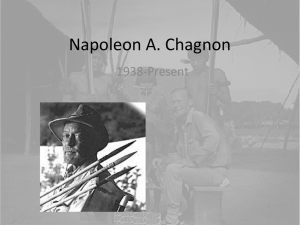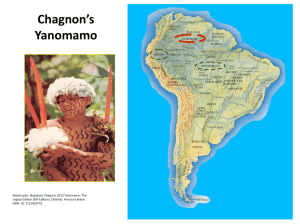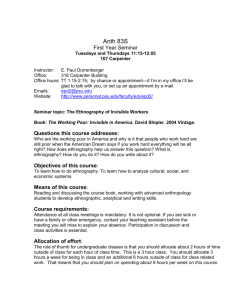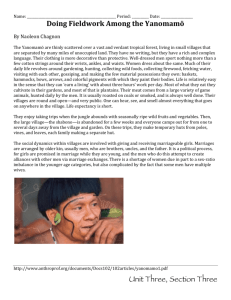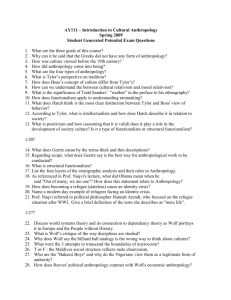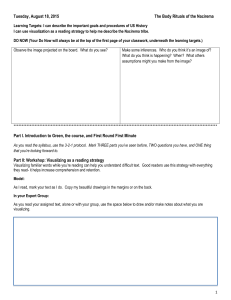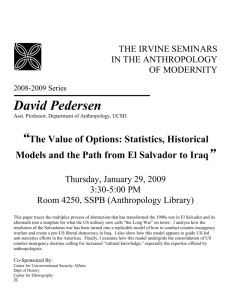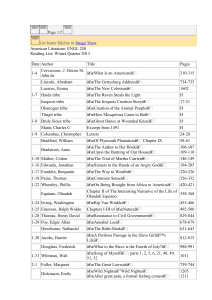FALL 13 Sociocult and Ling Study Guide
advertisement
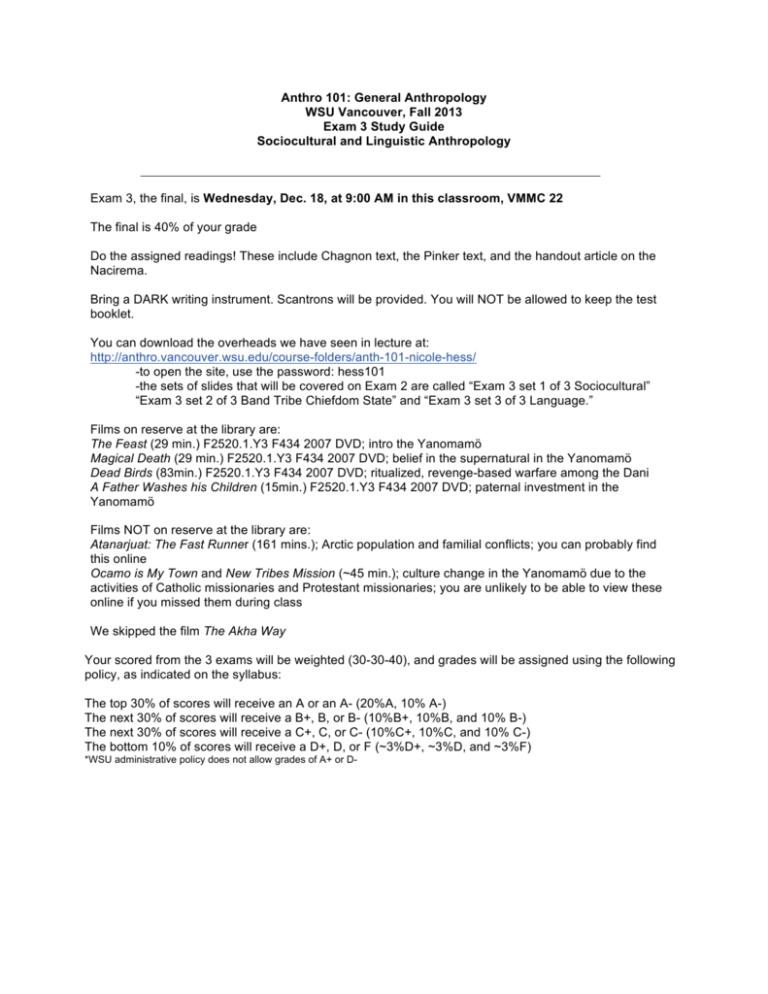
Anthro 101: General Anthropology WSU Vancouver, Fall 2013 Exam 3 Study Guide Sociocultural and Linguistic Anthropology Exam 3, the final, is Wednesday, Dec. 18, at 9:00 AM in this classroom, VMMC 22 The final is 40% of your grade Do the assigned readings! These include Chagnon text, the Pinker text, and the handout article on the Nacirema. Bring a DARK writing instrument. Scantrons will be provided. You will NOT be allowed to keep the test booklet. You can download the overheads we have seen in lecture at: http://anthro.vancouver.wsu.edu/course-folders/anth-101-nicole-hess/ -to open the site, use the password: hess101 -the sets of slides that will be covered on Exam 2 are called “Exam 3 set 1 of 3 Sociocultural” “Exam 3 set 2 of 3 Band Tribe Chiefdom State” and “Exam 3 set 3 of 3 Language.” Films on reserve at the library are: The Feast (29 min.) F2520.1.Y3 F434 2007 DVD; intro the Yanomamö Magical Death (29 min.) F2520.1.Y3 F434 2007 DVD; belief in the supernatural in the Yanomamö Dead Birds (83min.) F2520.1.Y3 F434 2007 DVD; ritualized, revenge-based warfare among the Dani A Father Washes his Children (15min.) F2520.1.Y3 F434 2007 DVD; paternal investment in the Yanomamö Films NOT on reserve at the library are: Atanarjuat: The Fast Runner (161 mins.); Arctic population and familial conflicts; you can probably find this online Ocamo is My Town and New Tribes Mission (~45 min.); culture change in the Yanomamö due to the activities of Catholic missionaries and Protestant missionaries; you are unlikely to be able to view these online if you missed them during class We skipped the film The Akha Way Your scored from the 3 exams will be weighted (30-30-40), and grades will be assigned using the following policy, as indicated on the syllabus: The top 30% of scores will receive an A or an A- (20%A, 10% A-) The next 30% of scores will receive a B+, B, or B- (10%B+, 10%B, and 10% B-) The next 30% of scores will receive a C+, C, or C- (10%C+, 10%C, and 10% C-) The bottom 10% of scores will receive a D+, D, or F (~3%D+, ~3%D, and ~3%F) *WSU administrative policy does not allow grades of A+ or D- Terms and Concepts to study (This is NOT an exhaustive list of important points. You are responsible for nd all lecture material covered AFTER the 2 exam, all films viewed in class, the Nacirema handout, and the Chagnon and Pinker texts; see the posted slides and consult your lecture notes. Sociocultural anthropology Hobbes/Rousseau Cultural relativism Cultural construction Western European colonialism Example: global maps Social complexity: band, tribe, chiefdom, state Patterns of subsistence Characteristics of culture Methods, History, Theory Sex, marriage, family, kinship Culture change Missionaries and colonialism ethnocentric society culture ethnography, ethnographer indigenous raiding reciprocal obligation with gifts/favors waiteri headman tribe shabono shaman ebene hekura child betrothal social stratification social circumscription (Chagnon) geographic circumscription (Carneiro) micro and macro village movement jaguar myth Yanomamö cosmos mother’s brother cross- v. parallel cousin marriagesedentism cultural evolutionism impersonal supernatural power cultural model for illness biomedical model for illness functions of sorcery/witchcraft ways of categorizing cultures kinship diagrams – meanings of symbols Methods? Participant-observation Band Tribe Chiefdom State Linguistic Anthropology BEV SAE Critical ages Pidgin Creole Sign language William’s syndrome Broca’s aphasia Wernicke’s aphasia Instinct Evolutionary psychology Phoneme Morpheme Parts of speech Universal grammar Sentence tree Ethnocentrism Labov Nicaragua study Sign Language Lipreading Specific language impairment “chatterbox” syndrome language development error-fixing in children leaning grammar Wild children and language ape language gene/language evidence for human diaspora
